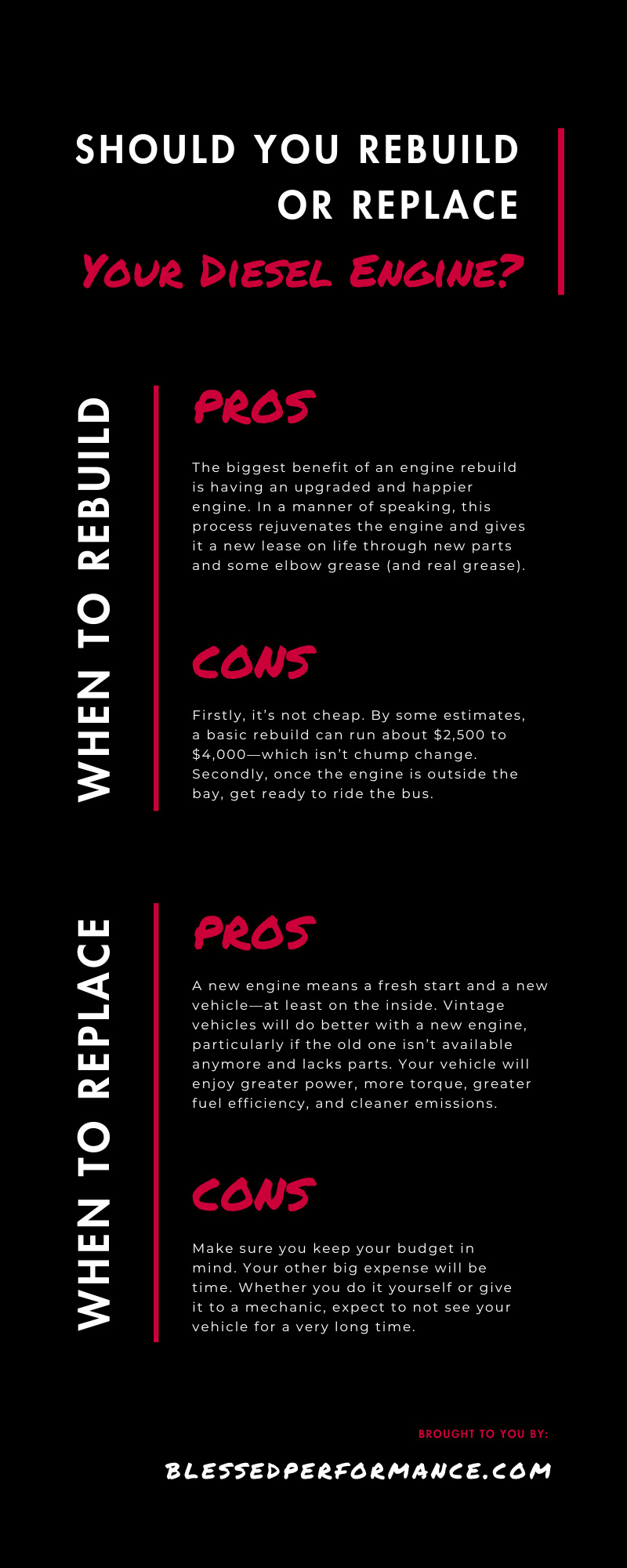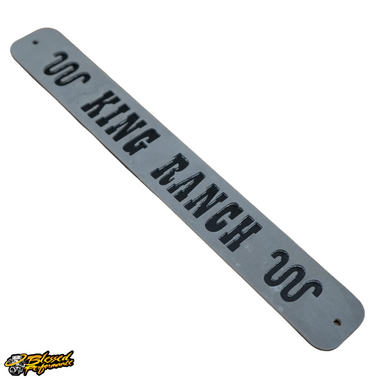Should You Rebuild or Replace Your Diesel Engine?
Estimated 0 min read
When it’s time for a change, your diesel engine will let you know. Faulty engines send out a series of signals, including knocking, stalling out, smoke, odd noises, overheating, poor mileage, and more. When your engine talks, it’s time to listen and decide how to rectify the situation. However, it’s best to take a moment to review your options. A faulty diesel engine might just need an oil or filter change or a basic repair or two. But when an engine is ready to give up the ghost, you have two choices: rebuild it or replace it.
Speaking with your mechanic can clear things up. But if you’re more of a do-it-yourselfer when it comes to car repair, you know your engine better than they do. Still, if you’re not sure which route to take, then consider the following tips for determining whether you should rebuild or replace your diesel engine.
When To Rebuild
Let’s address what rebuilding an engine involves versus repairing. Rebuilding, or overhauling, a diesel engine means replacing the most important parts of the engine. These parts can be gaskets, injectors, pistons, liners, bearings, connecting rods, the crankshaft, and so on. This task doesn’t involve patching up a few things and leaving it at that. You could just replace a few things, but rebuilding your engine is a longer and more intense process. You must remove the engine from the bay, replace the parts, clean the engine, and then reinstall it. How much work you end up doing depends on what the engine requires to achieve optimal performance. In a matter of speaking, a rebuilding is a series of repairs and replacements.
Rebuilding: Pros
Obviously, the biggest benefit of an engine rebuild is having an upgraded and happier engine. In a manner of speaking, this process rejuvenates the engine and gives it a new lease on life through new parts and some elbow grease (and real grease). Replacing old, broken, and worn-out parts has almost no downside.
Overhauling does exactly what it sounds like too: you rebuild and empower the engine to boost its power and torque. New parts are often vast improvements on older ones, with adjustments and upgrades made to their designs over the years to enhance performance. Sizing up certain parts such as pistons, injectors, rods, and others can make the engine bigger and, therefore, more powerful. Finally, even a competent rebuilding can improve your vehicle’s fuel and oil use. You’ll see a huge improvement in gas mileage and lower prices at the pump as well.
Rebuilding: Cons
It’s a dirty job, but someone’s got to do it—and when you start an engine rebuild, you must commit to finishing it. Don’t embark on an engine rebuild lightly. Firstly, it’s not cheap. By some estimates, a basic rebuild can run about $2,500 to $4,000—which isn’t chump change. Imagine discovering that the problems are more extensive than you first imagined, which can jack up the costs to the tens of thousands or more! Secondly, once the engine is outside the bay, get ready to ride the bus.
This is no weekend chore that you can start in the morning and wrap up by early afternoon. Your engine, and therefore your vehicle, will be out of commission for several weeks. And let’s not forget the sinking feeling upon discovering your big rebuild project was all for naught. It’s unlikely, but you may find that you only needed to make a simple repair once you start. Be sure you’re ready to have your weekends and evenings occupied for a month or so.
When To Replace
Replacement is self-explanatory: out with the old and in with the new (engine). Replacement is as big a time and money commitment as rebuilding, though it comes with its own hassles as well. Before you ditch the old diesel, however, decide if purchasing and installing a new engine is the best choice. A diesel engine can last tens of thousands of miles, even a million miles, if you look after it properly.
Still, all things come to an end, and engines are no exception. Engines can “die” in several ways. A blown head gasket can cause the oil and coolant to leak, making the engine overheat. If not caught in time, the leakage can permanently ruin the engine. If a timing belt breaks, it can force the pistons to hit the oil pan, break up, and enter other parts of the engine, causing further destruction. Also, an unlubricated engine can seize up, melting the cylinders, cracking the engine block, and melting parts of the engine. Once that happens, it’s all over for that engine.
Replacing: Pros
Obviously, a new engine means a fresh start and a new vehicle—at least on the inside. Vintage vehicles will do better with a new engine, particularly if the old one isn’t available anymore and lacks parts. As with a rebuild, your vehicle will enjoy greater power, more torque, greater fuel efficiency, cleaner emissions, and all the other benefits of a new vehicle. A longer life is in the cards, as well as fewer repairs in the future.
Replacing: Cons
You know the first con, don’t you? That’s right—money. A brand-new 5.9 Cummins motor can run you $10,000 to $12,000 or so, depending on the dealer. When asking whether you should rebuild or replace your diesel engine, make sure you keep your budget in mind. Your other big expense will be time. Whether you do it yourself or give it to a mechanic, expect to not see your vehicle for a very long time. And if you don’t get your own hands dirty doing the job, hiring someone else will add labor and taxes to the final bill. And make sure you test the new engine with caution. Otherwise, you might find yourself back at square one with a cracked block or worse!
Have questions about rebuilding or replacing your vehicle’s diesel engine? Contact us for a consultation today!










